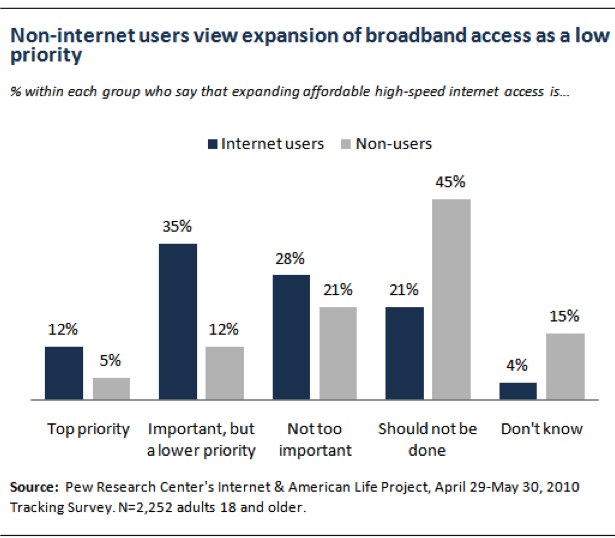Broadband investment: Critical to the future or misplaced priority?

When it comes to the expansion of broadband in the U.S., Washington is in a no-win situation.
It's bad enough that the FCC continues to struggle to establish a national broadband policy, hampered by a defeat in a lawsuit with Comcast and now controversial headlines over a plan crafted by Google and Verizon.

Now, a survey conducted by the Pew Internet and American Life Project (PDF) finds that more than half of Americans (53 percent) think that broadband expansion in the U.S. isn't important enough to be a government priority, with some going so far as to say that efforts to expand broadband should be abandoned.
But here's one important asterisk: The "highest concentration" of people opposed to broadband expansion efforts fall into the over-50 age group, one that largely doesn't find the Internet to be relevant to their lives. That's understandable, given that the over-50 folks didn't grow up with technology the way today's teenagers have. Still, even across other age groups and demographics, the numbers against government involvement are pretty high.
With the current state of affairs in the U.S. - from the costs of war to the unemployment rates and underwater mortgages - it's easy to understand why so many Americans might find it hard to see the light at the end of the broadband tunnel as a way out of economic troubles.
But President Obama was absolutely right when he said, just before his inauguration that "It is unacceptable that the United States ranks 15th in the world in broadband adoption." Ask anyone who has ever traveled abroad and they won't hesitate to tell you how far behind the U.S., compared to other countries.
The government's investment isn't in technology. Its investment is in the widespread access to technology. If Washington is serious about making the U.S. a world leader in technology, then this is a first-step investment toward that goal.
The survey's findings don't undercut the federal government's efforts to increase the adoption of broadband, an FCC spokesperson told the Washington Post. Instead it illustrates the importance of educating Americans on the benefits of broadband as it relates to healthcare, education and jobs. Spokeswoman Jen Howard told the Post:
There are still too many barriers to broadband adoption in America. That's why the National Broadband Plan lays out a strategy for improving digital literacy and ensuring that all Americans can take full advantage of the benefits of broadband.
A few other bullet points from the survey:
- The number of African-Americans using broadband jumped 10 percent from 2009, from 46 percent to 56 percent, while the number of whites only grew by 2 percent, from 65 percent to 67 percent. The gap between whites and African-Americans narrowed from 19 percent last year to 11 percent this year.
- The majority of broadband subscribers pay for basic service but 36 percent, down from 39 percent last year, said they paid for premium broadband speeds. Interestingly, those who said they don't know what they subscribe to jumped to percentage points, now at 13. The study hinted that bundled packages with TV, phone, Internet and wireless may leave some people confused about the services they pay for.
- The average broadband subscriber pays $41.18 per month for service.
- About one-fifth, or 21 percent, of all Americans do not use the Internet